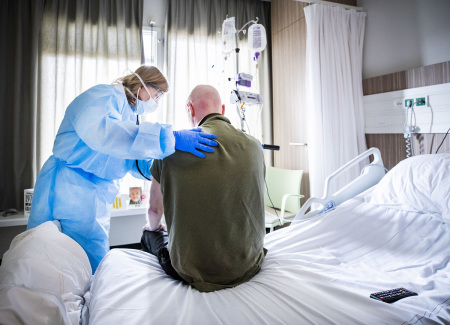Dutch under 60 can now starve themselves to death with help from their doctor

A Dutch medical federation has lifted the age limit for patients seeking to die by ceasing to eat and drink.
Last week, the Royal Dutch Society for the Promotion of Medicine (KNMG) shared the new guidelines, titled “Care for people who consciously stop eating and drinking to hasten the end of life.” The previous guideline from 2014 did not recommend assisting people younger than 60 to die of starvation and dehydration.
“People increasingly need control over their own end of life. They have various options for this, including consciously stopping eating and drinking,” the KNMG stated. “Every competent person can choose and implement this themselves. Good guidance from healthcare providers is important.”
The medical federation opted to drop the initial guidance due to several cases of individuals younger than 60 requesting to die in this manner.
"The reason for maintaining an age limit in the old guideline was that at the time, no patients were actually described who were under the age of 60, and who brought the process to an end," Alexander de Graeff, who chairs the committee behind the new guidelines, explained in a statement to NOS.
De Graeff added that he believes if patients want to end their lives, then it's better for them “to do it with guidance than without guidance."
As the outlet reported, there have been multiple cases within the last 10 years of people under 60 ending their lives, sometimes without the help of hospice, by ceasing to eat and drink. Approximately 700 people in the Netherlands die every year by deliberately depriving themselves of food and water.
Academic Hospice Demeter has temporarily stopped admitting patients who are physically healthy but are seeking to die, even if they’re over 60, according to NOS.
Niels Mulder, chairman of the Dutch Psychiatry Association, told NOS that someone expressing a desire to die should speak with a mental health professional to explore why they feel this way. Mulder also proposed that hospices work to offer mental health care so that these people “can still see life prospects.”
The Royal Dutch Society for the Promotion of Medicine did not respond to The Christian Post’s request for comment.
According to a brochure from the Dutch Association for a Voluntary End of Life, the cessation of eating and drinking can be more difficult for younger people attempting to end their lives this way while they are still healthy, as it can take longer to die.
In November, the Dutch news outlet NL Times reported that a poll conducted by Kieskompas of nearly 200,000 people found that 80% of the Dutch supported allowing elderly people who feel they've reached the end of their lives to obtain assisted suicide.
Ten percent of participants said they opposed expanding eligibility for legal assisted suicide to include those who merely think their useful lives have come to an end, while another 10% did not express an opinion.
According to a DutchNews report from last April, more than 8,700 people died by euthanasia in the Netherlands last year, a 14% increase from the previous year. The report also noted a 34% increase in the number of euthanized patients who had been suffering from dementia.
Another study, "Does Legalizing Assisted Suicide Make Things Better Or Worse?" released in November 2022 by the Anscombe Bioethics Centre, found that nations that have legalized assisted suicide or euthanasia have higher rates of “self-initiated” suicides. The study also found that women were the most likely to die by self-inflicted suicide in jurisdictions that have permitted euthanasia and assisted suicide.
Wesley J. Smith, chair and senior fellow at the Discovery Institute's Center on Human Exceptionalism, told CP at the time that the study’s results did not surprise him.
“Assisted suicide advocacy is, literally, suicide advocacy, even if promoters deploy deflecting euphemisms such as, ‘aid in dying,’” Smith said. “A society can’t be pro-some suicides and then be surprised that some suicidal people outside the permitted categories think it includes them.”
Samantha Kamman is a reporter for The Christian Post. She can be reached at: samantha.kamman@christianpost.com. Follow her on Twitter: @Samantha_Kamman





















